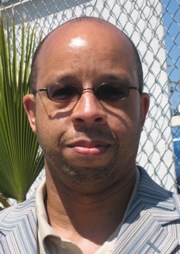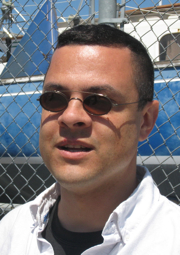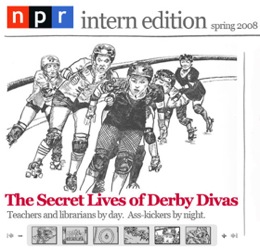The younger generation will be our future leaders. We hear that a lot in politics, but it also applies to media companies wondering who will be leading them into a digital future. National Public Radio has two programs — Next Generation Radio (NextGen) and Intern Edition — aimed at training young folks to do quality radio reporting the NPR way. Not surprisingly, those twentysomethings have also pushed NPR further into the digital realm, creating an eye-catching blog and using Public Radio Exchange (PRX), an online marketplace for radio reports, to get wider distribution for their work.
Both training projects are run by NPR’s Doug Mitchell, a veteran at the public broadcaster of 21 years. With NextGen, Mitchell travels around the country, training college students to do radio reporting with intensive one-week courses. Recently, he was in the San Francisco Bay Area training a group of Mills College students while working in conjunction with local public radio station KALW. (A previous NextGen project with Mills and KALW can be heard here.)
For Intern Edition, Mitchell gives NPR interns a 10-week training course, in which they produce a half-hour show and various audio pieces — along with a project blog. That means that the interns do more than just report stories. They’re also shooting photos for the blog and uploading audio there. This spring the interns used great black-and-white drawings to illustrate the site, the stories and even for their own headshots. Where did the drawing design come from? Two interns, Ariel Kitch and Lindsay Trotty, spearheaded the effort.
“When we started doing this about eight years ago, it was all about the story, getting opportunities to tell stories and learn the equipment,” Mitchell said. “Now, this particular group was amazing, because in our first meeting they said, ‘Let’s come up with a theme.’…So they started pitching ideas and two of the students started talking about web comics. And they said they could draw. ‘You can draw?’ I asked. ‘Yeah, we can draw.’”

Not only does the site have a web comics feel to it, but there’s also a two-part story about Katsucon, a Japanese pop culture convention, and a story told through a comic strip. This is not your typical NPR blog.
While NPR has made an effort to do more blogging and incorporate photos and video online, its next generation of producers and reporters will be more adept at a multi-tasking, multi-platform approach to news and features. Mitchell noted that the online audience for NPR.org skews younger than the over-the-air listening audience, and that the staffers who do digital work also are younger than their radio counterparts.
Plus, Mitchell and his team are developing a plan to incorporate more online elements to both training projects. For an upcoming NextGen project at WUNC, there will be a dedicated student web producer for the first time.
PRX, an online exchange for radio producers and programmers, has played an important role in giving wider exposure to the young radio journalists. Jake Shapiro, executive editor of PRX, told me there are about 128 NextGen stories up at PRX, and they’ve been licensed more than 60 times by stations that ran the content.
“We made a concerted push to help get NextGen pieces on PRX, partly because too few of them saw the light of day on NPR programs and they are excellent pieces that stations have found lots of opportunities to air,” Shapiro said via email. “We also see great alignment between NextGen’s goals and PRX’s mission to help surface new voices and cultivate new talent…There’s a lot more that we could do together as part of a vital pipeline for new and diverse talent in public radio/media.”
The following is an edited transcript of my discussion with Mitchell and NPR NextGen technical advisor Tom Krymkowski, both in person and over email.
How do you see NextGen changing to go beyond basic radio training?
Doug Mitchell: The next step is to adjust our approach to training. Not by throwing gear at people and giving them a week or two to learn it. Rather, examine what made us popular in the first place, examine our methods, question them, and then apply some new thinking toward the creating of content and give people a chance to learn new ways of creation or invent new ways or give them opportunities to ‘fail’ and start over.
Secondly, much of this new content needs to reflect the people who we serve and do not serve, with an emphasis on the people who are not there. There are millions who are not listening/consuming because we don’t talk to them on the air. So, put new perspectives on the web. That’s programming. And from where I sit, diverse programming starts with hiring people who are different from those who do the hiring. It’s training a wide swath of people. Different educations, economies and cultures and then encouraging those who rise to the top (for a variety of reasons) to stick in the public radio system and/or NPR.
The system needs to reach beyond traditional radio.
Do you think it will be easier to train young radio journalists in doing new media than veteran journalists?
Mitchell: The Knight Foundation has people inside NPR for several weeks, training selected staff members to think differently about their jobs and then their content. This week, Kim Perry from Knight, my executive producer and managing editor and I will meet and talk about shifting the thinking as we go into the Intern Edition process [for the summer].
Kim opened my thinking a bit about where to begin changing minds and that place is [with interns]. There’s no ‘legacy’ to concern ourselves with because Intern Edition starts completely from scratch each term with a room full of strangers and me as the continuity and institutional memory. What better place to develop new thinking about media, development and consumption than where nothing truly exists. Yes, we have past programs. But, each group wants to make their own mark, distinguish themselves from previous groups. You can see that over the life of the program.
Young people with no habits should be much easier to bring into the new realities (if they are not there already) than we who have been doing it a certain way for so long. Also, I have a student working as a web producer on our WUNC project next week. I have realized that we should open a space for converged media on our NextGen projects.
How will the web producer change what you do with NextGen?
Mitchell: This is an experiment. I can see the producer picking out a couple of the stories we are working on and looking for another way to tell the same story and do it exclusively online. That’s where I am with it now.
Tell me more about what happens with Intern Edition.
Mitchell: It’s a 30 minute show, and it’s done inside the building and it’s an event — it’s not about the radio. It’s about their web presence. If you go back to spend more time on [the site], you can see that for each headshot [of an intern], if you click on them, there’s a drawing beneath it.
Now I can take this [website] to the next set of interns and say, ‘Here’s what they did.’ And they’re very competitive people. It’s their site, so they can do what they want. I got about five or six emails from NPR staff who were at the event saying, ‘I wish our shows sounded like that.’ They could, but there’s all kinds of reasons that prevent this kind of creativity from happening.
How did the web presence for the spring Intern Edition evolve?
Mitchell: It came in a concentrated fashion this time. [“All Things Considered” intern] Travis Larchuk had done some of the legwork, and got it on the content management system of NPR and it’s done on WordPress. The blog started that way, our blog editor Meghan Forbes was an intern based in L.A. She didn’t need to be in DC to manage the blog. I told her to do interviews, write things, do whatever you want the blog to be. Then the other interns will see that, and they’ll get competitive and start doing the same things, too.
There are several entries with audio on them. Not because it’s cool to have audio there, but because it enhances what they’re writing.
We had a couple things come up over who owns what. One of our interns got so excited about a story he took it to our local station, WAMU, and they aired it on their local show. I hate to sound like the Gestapo, but I told him, ‘That’s our product, you can’t just take it somewhere else and repurpose it. It’s OK, but I have to know.’ When you create something inside our building, it belongs to NPR. You always have to make sure that you can repurpose your work, and you have to figure out the financial considerations.
This shows the evolution of the program. It started out with us trying to put shows together and that could get exhausting. But with PRX, it became less about the shows and more about the sections, because you can put segments up on PRX. Radio stations mainly download pieces and stations make decisions on whether those pieces make it into their own shows.
Tell me more about how PRX has helped you and the trainees.
Mitchell: When we were in Austin at KUT…they packaged a program together on these pieces [done by NextGen], and the theme was ‘the next generation,’ here’s what the next generation is doing. They put it on their HD Radio channel and on their website and I put up three pieces on PRX, and one of them already got rebroadcast on a station in New York.
PRX has been great because I’ve had pieces run in many places around the country, where I would have never got them on before. [Station managers] are looking through PRX and seeing NPR so that’s giving the students a leg up.

So web training is not something that’s been part of your formal training?
Tom Krymkowski: Not yet. Right now, we’re drawing on the experience of people who have been [in radio] for awhile. With newer media, there’s a smaller group of people who can offer that. And in a short time frame, I believe students are going to need to learn about that side of it, but I don’t think one week is enough to introduce that to them. They need to learn reporting and get that covered. So if we could do another week, we could say, ‘You’ve got your work done, now let’s learn what to do next with it.’
I have a friend who’s a reporter here in the Bay Area, and she’s also a photographer for AFP and does convergent media, and we talk about the practicalities of reporting. How do you write about something while supplying photos while you’re Twittering and blogging? How do you file your photos? There are physical limitations to what you can do with the technology now. Until we have that core group of people who have learned [convergent media], then you’re not at the same level with writing, recording, mixing — that side of the storytelling process.
Mitchell: We are very good at what we know. We’re in the process of figuring out what we don’t know, learning it and then teaching it.
Do you sometimes feel that the NextGen students or NPR interns are more adept at new media than the other people working at NPR?
Mitchell: I sit where the new media NPR staffers are, and the average age is well under 40, and you go downstairs and the age goes up — for the listenership, too. The people we [train] are like my daughter, doing 10 things at the same time. I don’t know how she gets straight A’s doing all that stuff at the same time. But she can talk on the phone, do instant messaging, be online all at the same time and that’s the way it is for her. She doesn’t think anything of it. I’m the one who’s fascinated.
For somebody who is a millennial, these are the people who will run media in the future. We have to make sure to hand off what we’re doing to someone else. Think qualitatively. Is the photo taken well? Is the audio done well? If you take a very fundamental approach, get the basics right, then you can put it wherever you want.
Krymkowski: The rate of change is changing faster. People who have been doing this the longest, they’re used to a certain process and approach. They usually don’t take the next step to ask, ‘Where is this going?’ So when we do these projects, we try not to be stuck. We’re keeping each other up to speed on where this is all going. I work freelance on other projects, because you can’t learn it all in one place, in one institution. I work in other mediums other than audio. There are things you can bring over from other mediums.
When learning or teaching convergent media, I always stress that you have to get the basics down…If I was in charge of teaching convergence radio, I would want to teach the basic audio concepts, the basic photography concepts, the basics — and then take it to the next level.
*****
What do you think about NPR’s programs to train young radio journalists? How do you think they should incorporate multimedia and online journalism into their training? Share your thoughts in the comments below.


This is a great piece — and the NPR folks definitely seem forward thinking, and I love the part about not throwing gear at people, but analyzing what they did and why they did it.
Much of the public media is, I think. When I was at the Berkeley J-School in 1999-2000, some folks from PBS came to demo a 3D interface on a virtual video and text presentation that launched as a companion to a documentary.
It had the inklings of what we are seeing today.
In many ways multi-platform journalism harkens back to modern journalism in its infancy. Although limited by the tools of its respective day, production of news was often a solo undertaking; reporting, editorializing, distribution, graphic design, imagery etc. But advancing technology required constant adaptation to its onrushing evolution, resulting in subsequent specialization.
NPR is leading a renaissance of sorts, incorporating new tools and media, while advancing individual self-sufficiency and competence.